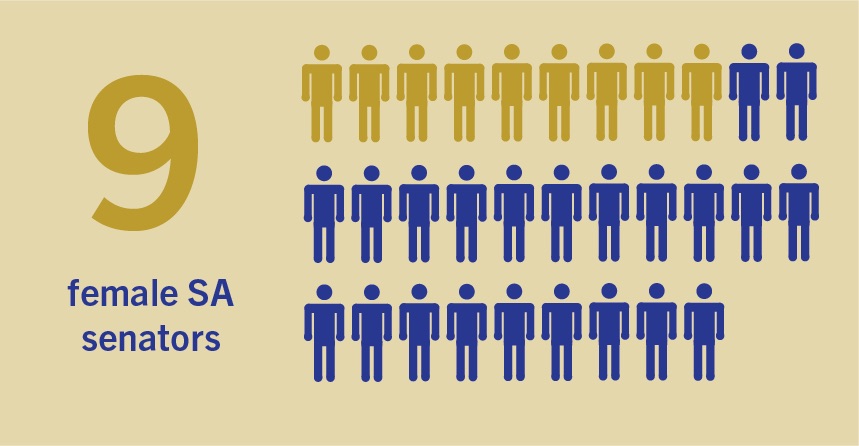Student Association leaders want the organization’s senate to represent more women.
The incoming SA Senate is comprised of nine women and 22 men, SA leaders said at a senate-elect meeting late last month. SA senators said the number of female senators inadequately represents a student body that is 60 percent female, which could present SA leaders with difficulties when debating legislation that affects women.
“We truly want to do the job we signed up for, which is to advocate for everybody,” SA Executive Vice President Amy Martin said. “We now have to work a little harder to make sure that everybody’s voice is included.”
Last academic year, 11 women served on a senate composed of 30 SA senators, according to the SA website. Women also held three of six committee leadership positions last year, but two female senators hold leadership positions this year.
Martin, who raised concerns about a lack of female representation at an April 30 senate-elect meeting, said SA senators must seek out women and students of color to speak about issues during public comment that the senate could address.
She added that she appointed three female students to serve in her three staff positions, like senate secretary and senate chief of staff, so the senate is a “more comfortable place for women.” Former SA President Ashley Le appointed women to fill 21 of 28 cabinet positions in her executive cabinet.

Alyssa Ilaria | Graphics Editor
Source: Student Association
Martin said she will prioritize training for all senators on subjects like Title IX and diversity and inclusion, and she will encourage the nine women elected to the senate this year to speak up about issues important to them. She said the last senate’s male-majority body may have caused some women to feel uncomfortable running for a senate seat where females are the minority.
“There are a lot of women and a lot of people of color, women of color, who are qualified who didn’t feel comfortable being here or who didn’t want to be here for whatever reason,” Martin said.
A senator representing the law school sued the SA last month in student court, claiming the SA lacks graduate student representation. Student leaders also highlighted a lack of female representation in the SA six years ago when five women held senate seats.
SA senators said the organization should widely advertise listening sessions on social media and in newsletters to ensure that women can voice their opinions.
Sen. Catherine Morris, CCAS-U and the vice chair of the finance committee, said a senate that does not adequately represent the women in the student body could blind the senate to issues female students face, like paying for menstrual products.
Morris said male senators may not prioritize maintaining initiatives like People for Periods – a student-led project supplying menstrual products in public campus bathrooms – because men do not need menstrual products.
“If there are less women in the senate, I think people might not realize the necessity, the lack of access in general, the cost of those products,” she said.
Sen. Raina Hackett, CCAS-U and the chair of the diversity and inclusion assembly, said the senate could struggle to pass legislation that usually impacts female students, like Title IX or sexual assault-related legislation, because fewer women are in the senate to vote. This academic year, the SA Senate unanimously approved a resolution calling on officials to require mandatory Title IX training for all student organization leaders.
Hackett said the diversity and inclusion assembly will continue hosting listening sessions that the assembly promoted this academic year and will reach out to women on social media or through newsletters. She said the listening sessions allow students to more intimately discuss concerns, like Title IX matters or a lack of safe spaces for women of color, instead of presenting in front of the entire SA Senate during public meetings.
“We are lacking the voices we need, but if the voices in the senate are willing to listen to all people in the room, then I think it doesn’t have to be a huge issue,” Hackett said.
Sen. Sparkle Mark, CCAS-U, said the imbalanced makeup of the SA reflects a broader issue of a lack of women and people of color in leadership roles on the national level in the U.S. Congress. Women currently occupy 127 of 535 seats in Congress.
Mark added that the student body did not elect enough women to senate positions this year. Twelve women ran for senate positions this year, according to the Joint Elections Commission website, the same number as last year.
She said the senate should tune into the voices of the nine women currently on the senate to gain perspective from female senators of different races, ethnicities and income levels.
“Women could be represented more, but I would also say that the women who are in SA right now are pretty diverse with their backgrounds to be advocates for the female population,” she said. “Even though it’s small, it’s pretty inclusive.”





